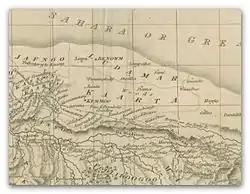Kingdom of Kaarta Kaarta | |||||||||
|---|---|---|---|---|---|---|---|---|---|
| c.1650–1890 | |||||||||
 The Kingdom of Kaarta on a map, published 1825 | |||||||||
| Capital | Sounsan, Guemou, Yelimane, Nioro du Sahel | ||||||||
| Common languages | Bambara | ||||||||
| Religion | traditional African religion | ||||||||
| Government | Monarchy | ||||||||
| Faama | |||||||||
• 1650-1710 | Massa | ||||||||
• 1754-58 | Sey Bamana Coulibaly | ||||||||
| History | |||||||||
• Massa founds the kingdom | c.1650 | ||||||||
• Re-established | 1754 | ||||||||
• Conquest by the Toucouleur Empire | 1854 | ||||||||
• Conquered by France | 1890 | ||||||||
• Annexed by France | 1904 | ||||||||
| Currency | cowries, mithqal | ||||||||
| |||||||||
| Today part of | Mali | ||||||||
Kaarta, or Ka'arta,[1] was a Bambara kingdom that arose after the fall of the Songhai Empire in what is today the western half of Mali and lasted until its destruction by Umar Tall in the 1850s.
History
Early history
According to legend, Sounsan the first capital of Kaarta was founded near Mourdiah around 1635 by Sunsana, son of Niangolo. His son Massa was famously productive both on the farm and in the bedroom, expanding his power and holdings by marrying his many daughters to men who would come fight for him and raiding his neighbors.[2]: 332 In 1710 rule passed to his son Benefali (r. 1710-1745), who fought a long war against the rising power of Bitòn Coulibaly and the Segou Empire. Benefali's son Foulakoro (r. 1745-1754) besieged Mourdiah, whose inhabitants begged for aid from Coulibaly. He came to Kaarta with an army, defeated Foulakoro, and captured him. The faama of Kaarta soon died in captivity.[3]: 124 : 172 [2]: 333
Re-Founding
Kaarta was re-established by Sey Bamana Coulibaly, who had fled Segou in 1754. Deniba Bo ruled from 1758-1761. Faama Sira Bo (r. 1761-1781) led a re-emergence of Kaarta as a regional power, establishing a permanent capital at Guemou and vassalizing Diarra in 1777 and Khasso, as well as raiding Beledougou and Bambuk.[4]: 41 [2]: 334 Sira Bo was succeeded by Desse Koro, who was defeated in battle by Mansong Diarra.[3]: 172 Bodian Moriba (r.1818-1832) re-asserted the kingdom's power, made peace with Segou and moved the capital to Nioro du Sahel.[3]: 124
The kingdom was destroyed as an independent force in 1854 by El Hadj Umar Tall's jihad across West Africa; Umar Tall seized Nioro, and put the Faama Mamady Kandian and his entire family to death, ending the Massassi dynasty.[3]: 172
In 1878 the French governor of Senegal Briere de l'Isle sent a French force against the Kaarta Toucouleur vassal state along the north bank of the Senegal River. Blocked by the colonial minister in Paris, he argued that they were a threat to the Senegalese Imamate of Futa Toro (then a French client state) with which the British were poised to interfere. The Ministry gave in and on 7 July 1878, a French force destroyed the Kaarta Toucouleur fort at Sabouciré, killing their leader, Almany Niamody. This portion of the Kaarta vassals was then incorporated into the Khasso protectorate kingdom.[5]
French Colonel Louis Archinard later conquered the entire territory of the former Kaarta kingdom in 1890, which was formally annexed into French West Africa in 1904.
Government
Political power was tightly controlled by the Massasi clan, and succession rarely caused conflict like it did in the Segou Empire. They ensured that the military leadership, the tondjon, was loyal, and the core of the army answered directly to the king. Positions of power went to members of the clan who traditionally tended to the royal family's guardian spirit.[2]: 338
Economy
Kaarta was an important destination and transshipment point for salt from the Saharan regions of Tagant and Hodh.[4]: 3
References
- ↑ "Malian traditional polities".
- 1 2 3 4 Izard, M.; Ki-Zerbo, Joseph (1992). "From the Niger to the Volta". In Ogot, B. A. (ed.). General History of Africa vol. V: Africa from the Sixteenth to the Eighteenth Century. UNESCO. Retrieved 16 September 2023.
- 1 2 3 4 Page, Willie F. (2005). Davis, R. Hunt (ed.). Encyclopedia of African History and Culture. Vol. III (Illustrated, revised ed.). Facts On File.
- 1 2 Gomez, Michael (2002). Pragmatism in the Age of Jihad: The Precolonial State of Bundu (2nd ed.). UK: Cambridge University Press. ISBN 9780521528474.
- ↑ A. S. Kanya-Forstner, The Conquest of the Western Sudan. Cambridge University Press, (1969), pp. 57-59